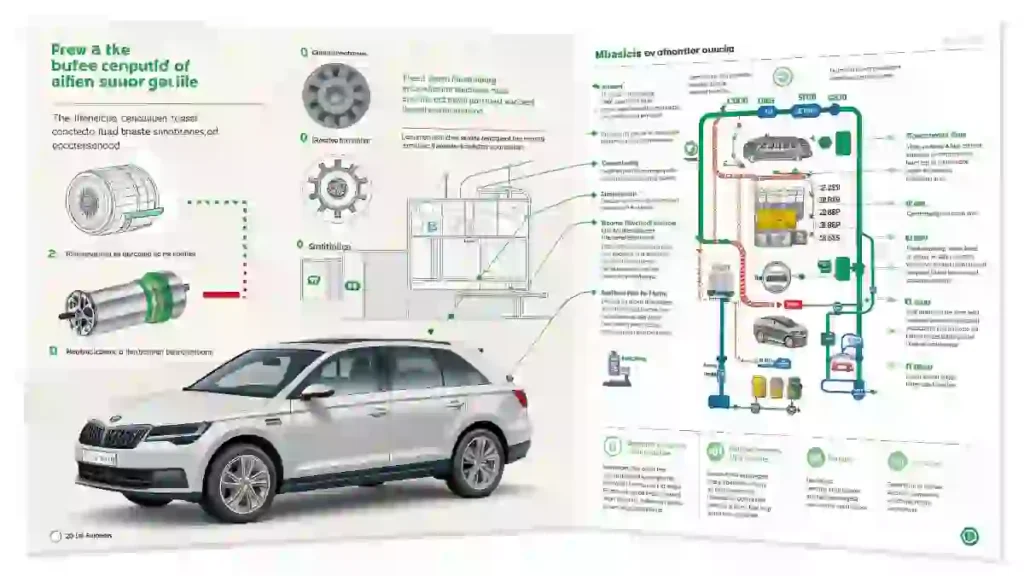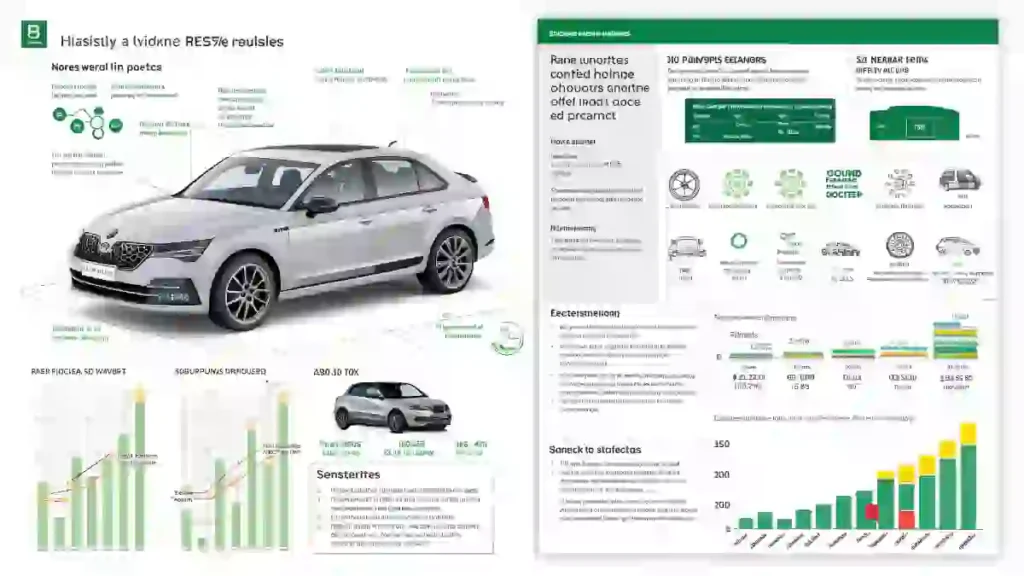
Introduction to The Ultimate Technical Guide to Skoda Petrol Engines
Skoda, a well-known automobile manufacturer based in the Czech Republic, has carved a significant niche within the global automotive industry since its establishment in 1895. As part of the Volkswagen Group, Skoda has evolved remarkably, combining traditional engineering with modern innovations. This evolution has led to the development of a diverse range of vehicles, with petrol engines playing a pivotal role in enhancing their appeal among consumers.
Petrol engines have become a cornerstone of Skoda’s lineup, serving as the driving force behind many of its popular models. These engines are regarded for their efficiency, performance, and, importantly, their ability to deliver a smooth and responsive driving experience. Petrol engines provide a competitive edge, particularly in urban environments where everyday usability and performance are paramount.
Throughout the years, Skoda has invested significantly in refining its petrol engine technology, implementing advanced engineering solutions that prioritize performance, reliability, and environmental considerations. This ongoing commitment to innovation ensures that Skoda petrol engines maintain relevance in an ever-changing market, where demands for fuel efficiency and lower emissions continue to grow.
In recent years, the integration of technological advancements such as direct fuel injection and turbocharging in Skoda petrol engines has enhanced overall performance while ensuring compliance with stringent emission standards. This dedication to engineering excellence not only enhances the driving experience but also solidifies Skoda’s reputation for reliability and customer satisfaction.
As we delve deeper into this technical guide on Skoda petrol engines, we will explore various aspects including design specifics, performance metrics, and the future direction of engine development within the brand. This exploration will provide both enthusiasts and potential buyers with a comprehensive understanding of what Skoda has to offer regarding petrol engines.
Types of Petrol Engines Used in Skoda Vehicles
Skoda has built a reputation for engineering reliable and efficient vehicles, and the types of petrol engines it employs are a significant factor in this regard. Primarily, Skoda utilizes three main categories of petrol engines: inline, V-type, and turbocharged engines. Each of these engine types offers unique characteristics that appeal to a wide range of consumers, effectively meeting different performance and fuel efficiency needs.
Inline engines are the most common in Skoda’s lineup, particularly in smaller and mid-sized models. These engines are characterized by their arrangement of cylinders in a single vertical or horizontal line. Inline engines are known for their simplicity and ease of maintenance, presenting a lower overall complexity compared to other configurations. Added benefits include a smooth operation and efficient fuel consumption, making them particularly attractive to everyday drivers.
V-type engines, often found in larger Skoda models, are designed with two banks of cylinders forming a “V” shape. This architecture allows for more power and performance, particularly in high-end or sport-oriented variants. Skoda employs V-type engines to deliver enhanced torque and acceleration, appealing to those seeking a more dynamic driving experience. While these engines can provide superior performance metrics, they can also increase the complexity of the engine design, which may affect repair costs and maintenance intervals.
Turbocharged engines have gained popularity in recent years due to their ability to deliver high power output while maintaining good fuel efficiency. Skoda incorporates turbocharging technology across various models to optimize performance and emissions. These engines typically feature smaller displacement capacities but use forced induction to significantly enhance power without compromising fuel economy. By utilizing advanced analytics, Skoda ensures that these turbocharged engines provide exceptionally responsive performance while adhering to stringent environmental regulations.
In conclusion, the diverse range of petrol engines used in Skoda’s vehicles—including inline, V-type, and turbocharged engines—demonstrates the company’s commitment to engineering excellence. Each type offers distinct advantages, making Skoda a versatile option for consumers looking for reliable performance across different driving needs.

Technology Behind Skoda Petrol Engines
Skoda has long been recognized for its commitment to innovation, particularly in the realm of petrol engines. One of the standout technologies used in Skoda’s engines is Turbocharged Stratified Injection (TSI). This inventive technology optimally combines turbocharging and direct fuel injection to significantly enhance performance and efficiency. With TSI, a smaller, lighter engine can produce power comparable to larger engines, which effectively helps in reducing overall fuel consumption while delivering impressive acceleration. This approach is particularly valuable in the context of today’s rigorous emissions standards, as it allows Skoda to produce engines that are both powerful and environmentally friendly.
Another advanced technology employed in Skoda petrol engines is direct fuel injection. This method injects fuel directly into the combustion chamber at extremely high pressures, allowing for more precise control over the air-fuel mixture. As a result, Skoda’s engines can achieve higher thermal efficiency, translating to better fuel economy and lower CO2 emissions. Direct injection also enhances the engine’s responsiveness, providing drivers with a more dynamic driving experience. Additionally, this technique minimizes fuel wastage, further improving the overall efficiency of Skoda vehicles.
Adding to these innovations is the implementation of variable valve timing, which allows for the adjustment of valve opening and closing times according to driving conditions. This adaptability ensures that the engine operates efficiently across a wide range of speeds and loads, maximizing performance while minimizing fuel consumption. By fine-tuning the timing of valve operations, Skoda achieves improved torque delivery at lower RPMs, which is essential for smooth acceleration and responsiveness. The integration of these advanced technologies underscores Skoda’s dedication to producing petrol engines that not only meet but exceed modern automotive performance, efficiency, and emissions criteria. As a result, the technical guide to Skoda petrol engines illustrates a forward-thinking approach to engineering, where efficiency and performance coexist harmoniously.

Key Features of Skoda Petrol Engines
The Skoda petrol engines are engineered with several distinctive features that cater to both performance and efficiency, providing drivers with an enjoyable experience on the road. One of the most significant characteristics is their lightweight construction. This design attribute not only contributes to better fuel efficiency but also enhances the vehicle’s overall responsiveness. Reduced weight allows for improved acceleration and braking, making driving more engaging and dynamic.
In terms of operation, Skoda petrol engines are known for their smooth performance. The engineering involved in these engines focuses on minimizing vibration and sound, leading to a quiet and pleasant driving experience. This is particularly evident during highway cruising, where noise levels remain low and the ride stable. Advanced technical innovations, such as balanced shaft systems and premium engine mounting, further improve this aspect, enabling a seamless transition through various RPM ranges.
Another essential feature of Skoda petrol engines is their low maintenance requirements. These engines are designed for durability and longevity, utilizing high-quality materials and advanced technology that reduce wear and tear. Regular servicing intervals are generally straightforward and economical, allowing owners to keep their vehicles in optimal condition without incurring excessive costs. This reliability resonates well with technical enthusiasts and average drivers alike, as it provides peace of mind that the vehicle will perform under varying conditions.

In addition to these core features, Skoda engines often come equipped with modern fuel injection systems, which optimize fuel delivery and enhance efficiency. With their commitment to innovation, Skoda has succeeded in developing petrol engines that not only meet emissions standards but also provide an enjoyable driving experience. The combination of lightweight construction, smooth operation, and low maintenance continues to make Skoda petrol engines a compelling choice in the automotive market.
Performance Metrics of Skoda Petrol Engines
The performance of Skoda’s petrol engines sets a benchmark in the automotive sector, particularly when considering metrics like horsepower, torque, acceleration, and fuel economy. Skoda has developed a range of petrol engines tailored to meet varying needs, from city driving to high-performance scenarios.
Horsepower is a crucial indicator of an engine’s capability, demonstrating its power output. Skoda petrol engines are designed to offer commendable horsepower figures across their lineup. For instance, the Skoda Octavia features an engine option that delivers approximately 150 hp, which is competitive when compared to other vehicles in its class. Torque, the twisting force that enables acceleration, is another vital performance metric. With engines producing up to 250 Nm of torque, Skoda’s offerings ensure a responsive driving experience, crucial for quick overtakes and smooth acceleration.
Acceleration times are a practical measure of performance, showcasing how swiftly a vehicle can respond to driver commands. The Skoda Superb, equipped with its 2.0 TSI petrol engine, can achieve 0-100 km/h in around 7.5 seconds, placing it competitively among rivals. Additionally, fuel economy remains a focal point for many consumers, directly influencing cost-efficiency and environmental considerations. The Skoda Scala, with its 1.0 TSI petrol engine, boasts an impressive fuel economy of approximately 5.0 L/100 km, illustrating Skoda’s commitment to producing low-cost and environmentally friendly vehicles.
When compared to competitors like Volkswagen and Ford, Skoda petrol engines consistently demonstrate superior performance metrics. The combination of robust horsepower, high torque, and efficient fuel consumption positions Skoda as a strong contender in the petrol engine market, and its analytical approach in engine development plays a significant role in these achievements.
Maintenance and Troubleshooting
Maintaining Skoda petrol engines is crucial for ensuring their longevity and reliability. Regular maintenance tasks should be scheduled to keep the engine in optimal condition. Key maintenance activities include oil changes, air filter replacements, and spark plug inspections. Skoda recommends changing the engine oil and filter every 10,000 to 15,000 kilometers, depending on your driving conditions. Clean oil is essential for lubrication, reducing wear and tear on engine components.
Another essential maintenance task is the inspection of the air filter. A clogged air filter can hinder engine performance by restricting airflow, thus affecting fuel efficiency and overall power. Replacing the air filter every 20,000 kilometers or more frequently if driving in dusty environments can contribute significantly to performance improvements.
When it comes to common issues that may arise with Skoda petrol engines, one frequent concern is a misfiring engine. This can often be attributed to faulty spark plugs or ignition coils. Routine inspections can help identify these issues early, preventing more severe complications. Additionally, unusual noises or vibrations while the engine is running are signs that should not be ignored, as they may indicate underlying mechanical problems.
Troubleshooting can involve a variety of methods, including utilizing onboard diagnostics available in many Skoda models. This technical feature assists in identifying faults by providing error codes that indicate specific issues. When encountering warning lights on the dashboard, having a basic understanding of these codes can be invaluable for diagnosing problems before they escalate.
In the realm of analytics, keeping a log of maintenance activities and observed issues helps in recognizing patterns which may necessitate more frequent interventions. By following these maintenance protocols and employing effective troubleshooting methods, Skoda petrol engine owners can ensure a more reliable driving experience.
Environmental Impact and Emissions Standards
Skoda has continuously sought to demonstrate its commitment to environmental sustainability through the advancement of its petrol engines. The automotive industry has faced increasing pressure to mitigate the environmental impact of vehicle emissions, and Skoda has embraced this challenge, ensuring that its engines comply with stringent emissions standards. This compliance is not merely a legal requisite; it represents a core component of Skoda’s broader strategy to enhance sustainability and decrease its carbon footprint.
In recent years, Skoda has focused on developing petrol engines that not only meet but often exceed the current emissions regulations. These advancements are indicative of a proactive approach, showcasing Skoda’s dedication to producing vehicles that are both efficient and environmentally responsible. As part of its technical guide, Skoda has implemented innovative technologies to reduce pollutants such as nitrogen oxides (NOx) and particulate matter, which are significant contributors to air pollution.
Among the innovations adopted by Skoda, turbocharging and direct fuel injection have played crucial roles in enhancing engine efficiency. These technologies enable a reduction in fuel consumption, thereby lowering CO2 emissions across the range of Skoda petrol engines. Furthermore, the integration of hybrid technology in some models demonstrates Skoda’s commitment to continually evolving to meet environmental challenges.
This commitment extends beyond individual models, encapsulating the brand’s philosophy of incorporating sustainable practices into its overall production processes. The company utilizes analytics to monitor and assess the environmental impact of its operations, helping to minimize waste and optimize processes. Through these measures, Skoda is not only adhering to emissions standards but also contributing positively to the environment and promoting sustainable mobility. In conclusion, Skoda’s advancements in petrol engine technology epitomize the intersection of performance and environmental responsibility, solidifying its role as a leader in the automotive industry.
Future Trends in Skoda Petrol Engine Technology
The automotive industry is on the cusp of significant transformation, particularly in the realm of petrol engine technology. Skoda, a notable player in this sector, is actively investing in innovative approaches to enhance the performance and environmental sustainability of their engines. One prominent trend emerging within Skoda’s technical guide to future developments is the integration of electric hybrid systems. These systems are designed to combine traditional petrol engines with electric motors, allowing for reduced emissions while maintaining engine efficiency. This hybridization represents a pivotal shift towards optimizing fuel consumption and addressing the environmental concerns associated with fossil fuels.
Additionally, advancements aimed at improving fuel efficiency in Skoda petrol engines are becoming a priority. As regulations around emissions become stricter globally, manufacturers are compelled to enhance their engines to comply with these standards without sacrificing performance. Innovations such as turbocharging, direct fuel injection, and advanced engine management systems are being explored to achieve greater power output with reduced fuel consumption. Skoda’s commitment to research and analytics in this area is expected to foster the development of engines that not only perform better but also utilize petrol more effectively, further aligning with global sustainability goals.
Another critical focus for Skoda is the potential shift towards sustainable fuel sources. This includes exploring alternative fuels that can complement or replace traditional petrol. The feasibility of biofuels, synthetic fuels, and hydrogen fuel cell technologies is being evaluated to keep pace with an evolving automotive landscape. Skoda is poised to play a vital role in these innovations, resulting in more environmentally friendly engine options that cater to a growing consumer demand for sustainability. As these trends take shape, the future of Skoda petrol engines appears promising, blending performance enhancements with environmental accountability.

Conclusion and Final Thoughts
In conclusion, the exploration of Skoda petrol engines through this technical guide has revealed their pivotal role in the modern automotive market. Skoda has established a reputation for creating engines that successfully balance performance, efficiency, and sustainability. The company’s commitment to innovation and the continuous enhancement of their petrol engine offerings cater to the evolving consumer demands, thereby reflecting broader trends in the automotive industry.
The various models of Skoda petrol engines showcase advanced engineering that meets stringent environmental regulations while offering drivers enhanced driving experiences. From the dynamic driving capabilities of the engines to their robust fuel efficiency, Skoda remains a formidable player in the competitive automotive landscape. The use of cutting-edge technologies, such as turbocharging and direct injection in these engines, underpins their performance while ensuring lower emissions, reflecting Skoda’s dedication to sustainability.
Moreover, this guide has highlighted the importance of regular maintenance and care to ensure longevity and optimal performance of Skoda petrol engines. Ensuring that vehicles are serviced consistently will not only prolong engine life but also enhance overall vehicle efficiency. With an increasing focus on customer satisfaction, Skoda continues to provide exceptional after-sales support, which is essential for vehicle owners aiming for peak performance.
Ultimately, as consumers seek vehicles that offer both exhilarating performance and environmental responsibility, Skoda petrol engines stand out as a fitting choice. From the engineering principles that govern their design to the analytics surrounding customer preferences, Skoda’s approach remains aligned with the future of the automotive industry. Continual advancements in technology will likely enhance the capabilities of Skoda petrol engines, solidifying their position within the evolving automotive ecosystem.




